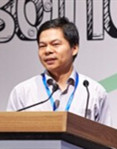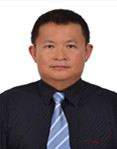Keynote Speakers

Prof. Dong Hwa Kim
Department of Instrumentation and Control Engineering, Hanbat
National University, South Korea
He got Ph.D degree at Dept. of Computational Intelligence and
Systems Science (K. Hirota Lab.), Interdisciplinary Graduate
School of Science and Engineering, TIT (Tokyo Institute of
Technology, K.), Tokyo, Japan as the title (Genetic Algorithm
Combined with Particle Swarm Optimization/Bacterial Foraging and
Its Application to PID Controller Tuning).
He has many work experiences, Professor, Director, Korean
Experts Center of TDT University, Vietnam, Dean, Graduate school
of Huree University, Mongolia, 2015, Prof., Dept. of Control
Eng., Hanbat National University, March 2, 1993-Feb. 2015,
Honorary Prof. Hanbat National University (Feb 28, 2015- ),
Associate fellow researcher, University Malaysia Sabah (Aug. 6,
2014 – Aug. 5, 2016), Visiting Professor, Mechanical, Optic,
Engineering Informatics, Budapest University of Technology and
Economic, March 20–Feb., 2013, Header of Admission office,
Hanbat National University, Aug.1, 2010-July. 28,2011,
President, Korea Institute HuCARE (President of Hu-CARE
(Human-Centered Advanced Technology Research/Education), Nov.
2009-, EU-FP7 (EU- Framework Programme) NCP (ICT) in Korea,
April 29, 2011-2015, Director, KNRF (Korea National Research
Foundation), 2006-2008, Visiting Prof., University of Alberta,
Canada, March 1, 1999-March 1, 2000, Inviting researcher, ANL
(Algonne National Lab.), USA, Aug. 1988-Dec. 1988, Inviting
Researcher, AECL (Atomic Energy Canada Lab.), Canada, Nov.
1985-Nov.1986, Korea Atomic Energy Research Institute, Nov.,
1977-March, 1993, Korea-Hungary Joint Work: Aug. 1, 2010-Feb.
28, 2011, ‘Robot motion related topics of the ETOCOM project’
Consultation with research staff members and giving related
lectures, President, Daedeok Korea-India Forum, March 1,
2010–2015, Vice President, Daedeok Korea-Japan Forum, March 1,
2010–2015
Director of Science Culture Research Institute, Korea Science
Foundation, Sept. 8, 2006 - Jan. 31, 2008, Vice-president of the
recognition board of the world congress of arts, sciences and
communications, IBC, Sept. 1, 2007-2010, UK.
He also has many activities in keynote speak and lecture in many
university (about 100 university) about future technology and
mega trend of technology including his research results.
He publishes several papers (around 60) and English books of
research results.
He has been studying and is currently interested in emotion
technology as artificial intelligence for future ICT and
emotional robot.
Speech Title: Drone Control by using Artificial Intelligence
Abstract: Jan.6, 2020 in CNN, there was a big surprising event in the world, which Pentagonattacked Iranian high military person by Drone. Also, there was another bigevent in the show CES2020 Lasvegas (Jan. 7-10).Ofcourse, there were many mentions about Drone and its importance.Whether we call themUnmanned Aerial Vehicles (UAVs), Flying Mini Robots, drones are rapidly growingin popularity. They are still in the infancy stage in terms of mass adoptionand usage except military, but drones have already broken through rigidtraditional barriers in industries, military, delivery, emergency, education,and others. Military usage of drones has become the primary use in today'sworld as mentioned before. Combat, survey missions and search, drone is themost important device have been leading research and development.Transportation usage of drones is growing up as second method. The market forcommercial and civilian drones will grow at a compound annual growth rate(CAGR) of 19% between 2015 and 2020, compared with 5% growth on the militaryside, according to BI Intelligence, Business Insider's premium researchservice.As glowing up drone, Many University establish departmentof drone to teach related technology. Drone technology is constantly evolving,so future drone tech is currently undergoing groundbreaking progressiveimprovement. Here is the breakdown of the technology generations: Generation 1(Basic remote control aircraft of all forms; Generation 2 (Static design Ixedcamera mount video; Generation 2 (Static design Ixed camera mount video underwayas 3DRobotics announced the world's Irst all in one recording and still photos,manual piloting control; Generation 3 (Static design, two-axis gimbals, HDvideo, basic safety models, assisted piloting; Generation 4 (Transformativedesigns, Three-axis gimbals, 1080P HD video or higher-value instrumentation,improved safety modes, autopilot modes); Generation 5 (Transformative designs,360° gimbals, 4K video or higher-value instrumentation, intelligent pilotingmodes); Generation 6 (Commercial suitability, safety and regulatory standardsbased design, platform and payload adaptability, automated safety modes,intelligent piloting models and full autonomy, airspace awareness; Generation 7(Complete commercial suitability, fully compliant safety and regulatorystandards-based design, platform and payload interchangeability, automatedsafety modes, enhanced intelligent piloting models and full autonomy, fullairspace awareness, auto action (takeoL, land, and mission execution).Currently, AI is combining inthis technology to analyze, control, survey. At this point, we should recognizewhy these technologies are important and teach and learn in University. Relatedthis topic, this lecture deals with AI based drone control (PID and fuzzy, andneural network). This describes dynamic, and suggests and proves controltopologies of drone (attitude controller, position controller, X-Y-Z control) throughsimulation.

Assoc. Prof. Jing Xingjian
Department of Mechanical Engineering, The Hong Kong Polytechnic University, Hung Hom, Kowloon, Hong Kong
Dr X.J. Jing received his degree from Zhejiang University,
China, in 1998, and was then with the Robotics Laboratory,
Shenyang Institute of Automation, Chinese Academy of Sciences
until 2005, where he undertook research into motion-planning and
stability analysis of mobile robots and tele-robotic systems,
and obtained MPhil and PhD in intelligent systems / robotics in
2001 and 2005, respectively. He started his PhD program studying
nonlinear systems and signal processing at the University of
Sheffield in Oct 2005, supported by the EPSRC-Hutchison Whampoa
Dorothy Hodgkin Postgraduate Award. Before he joined in the
Department of Mechanical Engineering, The Hong Kong Polytechnic
University, as an assistant professor in Nov 2009, he was a
research fellow with the Institute of Sound and Vibration
Research, University of Southampton since Aug 2008, where he
worked on modeling and signal processing of locust neuron
systems funded by a BBSRC (UK) project. He was promoted to
Associate Professor in 2015.
Dr. Jing currently serves as a Technical Editor of IEEE/ASME
Transactions on Mechatronics, an Associate Editor of Mechanical
Systems and Signal Processing, and editorial board members of
several other open-access journals.

Prof. Chua-Chin Wang
National Sun Yat-Sen University, Taiwan
Dr. Chua-Chin Wang received the Ph.D. degree in electrical
engineering from SUNY (State University of New York) at Stony
Brook, USA, in 1992. He was Chairman of this department during
2009 - 2012. He was CEO of Operation Center of
Industry-University Cooperation, NSYSU, in 2012-2014. He was
Dean, College of Engineering, from 2014 to 2017.
Dr. Wang’s research interests include memory and logic circuit
design, communication circuit design, neural networks, and
interfacing I/O circuits. He has published over 130 journal
papers, 260 conference papers, and 150 granted patents. In 2006,
he won “Distinguished Engineering Professor” Award of Chinese
Institute of Engineers and “Distinguished Engineer” Award of
Chinese Institute of Electrical Engineering in the same year. He
also won Distinguished Electrical Engineering Professor Award of
Chinese Institute of Electrical Engineers in 2007. In 2010, he
was honored to be Distinguished Professor of National Sun
Yat-Sen University. In 2012, he won “Distinguished Engineering
Professor” Award of Chinese Institute of Engineers and
Outstanding Research Award of NSYSU. He won 3 times of
Outstanding Industry-Academia Collaroration Award (2005, 2009,
2013). He became IET Fellow in 2012. He was named as ASE Chair
Professor in 2013. He was recognized with Outstainding Technical
Achievement Award of IEEE Tainan Section in 2018. He was elected
as Distinguished Lecturer of IEEE CAS Society for 2019-2020.
Dr. Wang was General Chair of 2007 VLSI/CAD Symposium, which is
the largest VLSI/CAD event in Taiwan. He was General Co-Chair of
2010 IEEE Inter. Symp. On Next-generation Electronics (2010
ISNE). He was General Chair of 2011 IEEE Inter. Conf. On IC
Design and Technology (2011 ICICDT). He was General Chair of
2012 IEEE Asia Pacific Conference on Circuits and Systems
(APCCAS), which is the flagship conference of IEEE CASS Region
10. He was Genenal Chair of 2015 Symposium on Engineering,
Medicine, Biology Applications.